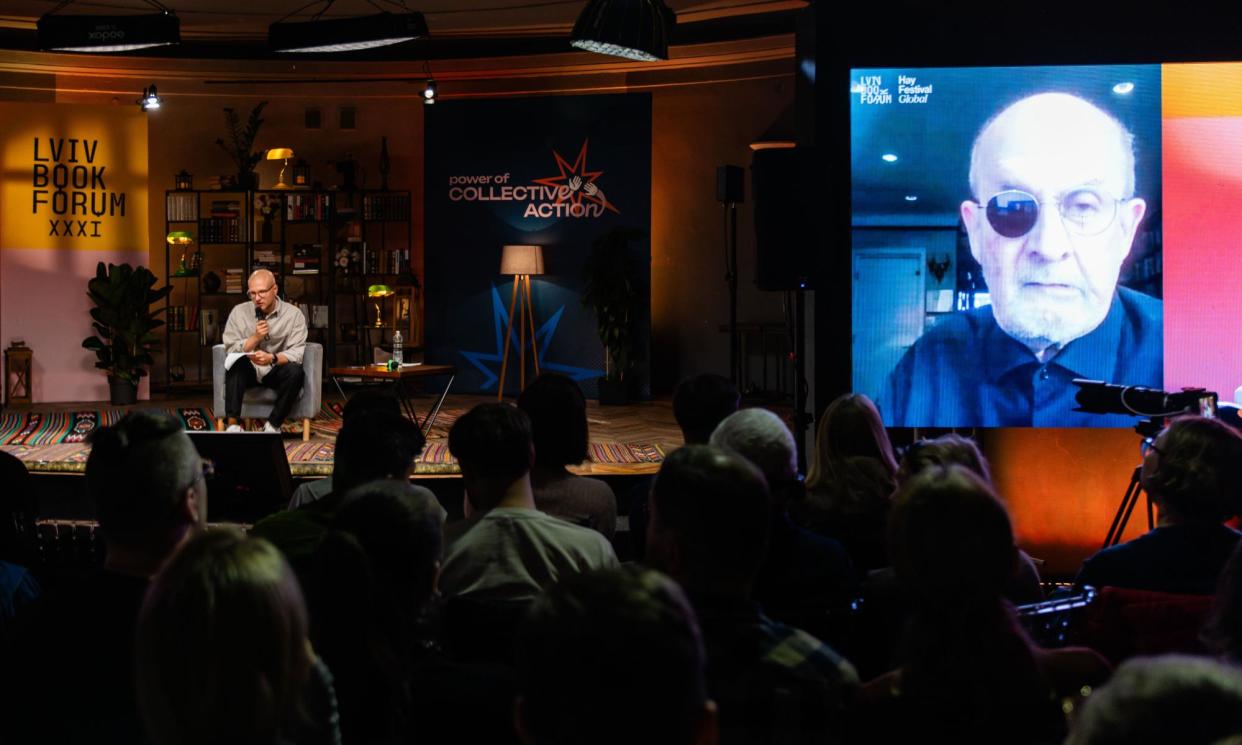Salman Rushdie to publish first work of fiction since 2022 stabbing

Salman Rushdie, who survived a stabbing attack in 2022 that cost him an eye, is writing a new work of fiction, he has told the audience at Lviv BookForum.
The author’s new work will comprise three novellas, each of about 70 pages, and each relating to one of “the three worlds in my life: India and England and America. And they all in some way consider the idea of an ending.”
Rushdie, 77, joined the literature festival in Ukraine by videolink primarily to discuss his most recent book, Knife. The memoir explores his recovery from the attack in August 2022, when an assailant rushed on to the stage at the Chautauqua Institution in New York state, where the author was about to speak at a public event.
In conversation with one of Ukraine’s most prominent writers, Oleksandr Mykhed, Rushdie told the audience in Lviv: “When you get to this age you obviously think about how long is left. There obviously aren’t 22 more [books] that are going to be written. If I’m lucky, there will be one or two.
“I’ve been thinking what [the philosopher] Theodor Adorno called ‘late style’, and critic and philosopher Edward Said’s famous essay called On Late Style, where he’s talking about what happens to artists near the end of their artistic careers.
“Essentially what he says is there are two ways of going. One is serenity, where you are reconciled to the world and reconciled to your own life and and you write out of that sense of peace, and the other is rage. My view is it can be both. It could be serenity at one moment, and rage in another. These don’t have to be permanent conditions.”
The novellas will be Rushdie’s first fiction project since the attack. His previous novel Victory City was completed before but published in 2023.
Rushdie also expressed solidarity with Ukraine and “the terrible situation in which you find yourselves”. He also likened his own tools for recovering from a traumatic attack to those of Ukraine.
“Whether you’re talking about a personal story or a political story, the control of the narrative is where the power lies,” he said. “What the Russians are trying to do is tell one version of the story and impose that on history. And it’s very important to not allow that to happen. That’s the big scale of what what you’re all going through in the smaller scale of what happened to me.”
It was out of reluctance to let the attacker define his story that he wrote Knife, Rushdie said. “I thought: ‘Well, I’m a storyteller. I want to take back control of the story so that I tell it in my way, and he becomes a part of my story, rather than me becoming a part of his story.’”
Set against the violence of the attacker in the book is the love of the poet, novelist and artist Rachel Eliza Griffiths, Rushdie’s fifth wife. “I began to see it as a kind of argument, if you like, between love and death, between bigotry and beauty,” he said. Griffiths, who is also a videographer, shot almost daily footage of her husband as he recovered, which was planned to form the basis of a documentary, he added.
“You know, human life is not only bombs and fascism and corruption and death, it’s also love and beauty. And I think maybe in the middle of a war, it’s important to remember that.”
Lviv BookForum has been running annually for 31 years, uninterrupted by Russia’s invasion of Ukraine. Authors from across the country were joined by figures from abroad for poetry readings and book launches, and to discuss subjects such as the impact on Europe of the 1990s, global democracy, civil society collective action, and books about Ukraine in the English language. In partnership with Hay festival, some are available to view online.
Held in venues including the city’s 16th-century Powder Tower, events have been packed with young audiences. For Rushdie’s there was standing room only.
Hadi Matar, 26, is charged with second degree attempted murder for stabbing Rushdie. His trial at Chautauqua county court is scheduled to begin on 15 October. It was delayed to allow for the publication of Knife in April, because it could potentially provide evidence for the defence. He has pleaded not guilty to the charge.
A separate federal indictment charges him with terrorism. He rejected a plea deal in July that would have shortened his state prison term but exposed him to the federal terrorism-related charge, the suspect’s lawyer has said.
In 1989 a fatwa was issued after the publication the year before of Rushdie’s novel The Satanic Verses. Ayatollah Ruhollah Khomeini condemned it as being against Islam, and it was banned in Pakistan and became the focus of violent protests. Rushdie’s Japanese translator was stabbed to death in 1991 and the author went into hiding, an experience described in his memoir Joseph Anton.
Rushdie’s 1981 novel Midnight’s Children was awarded the Booker prize. It later won the Booker of Bookers in 1994 and the Best of the Booker in 2008, awards marking the prize’s 25th and 40th anniversaries.


